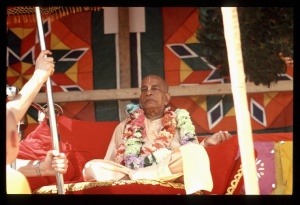SB 1.4.32: Difference between revisions
m (1 revision(s)) |
(Vanibot #0054 edit - transform synonyms into clickable links, which search similar occurrences) |
||
| (One intermediate revision by one other user not shown) | |||
| Line 1: | Line 1: | ||
{{info | {{info | ||
|speaker= | |speaker=Sūta Gosvāmī | ||
|listener=Sages of | |listener=Sages of Naimiṣāraṇya | ||
}} | }} | ||
[[Category:Srimad-Bhagavatam - Canto 01 Chapter 04]] | |||
[[Category:Bhagavatam Verses Spoken by Suta Gosvami - Vanisource|010432]] | |||
<div style="float:left">'''[[Srimad-Bhagavatam]] - [[SB 1|First Canto]] - [[SB 1.4: The Appearance of Sri Narada|Chapter 4: The Appearance of Śrī Nārada]]'''</div> | |||
<div style="float:right">[[File:Go-previous.png|link=SB 1.4.31]] '''[[SB 1.4.31]] - [[SB 1.4.33]]''' [[File:Go-next.png|link=SB 1.4.33]]</div> | |||
{{CompareVersions|SB|1.4.32|SB 1962|SB 1972-77}} | |||
{{RandomImage}} | |||
==== TEXT 32 ==== | ==== TEXT 32 ==== | ||
<div | <div class="verse"> | ||
tasyaivaṁ khilam ātmānaṁ | :tasyaivaṁ khilam ātmānaṁ | ||
manyamānasya khidyataḥ | :manyamānasya khidyataḥ | ||
kṛṣṇasya nārado 'bhyāgād | :kṛṣṇasya nārado 'bhyāgād | ||
āśramaṁ prāg udāhṛtam | :āśramaṁ prāg udāhṛtam | ||
</div> | </div> | ||
| Line 17: | Line 23: | ||
==== SYNONYMS ==== | ==== SYNONYMS ==== | ||
<div | <div class="synonyms"> | ||
''[//vanipedia.org/wiki/Special:VaniSearch?s=tasya&tab=syno_o&ds=1 tasya]'' — his; ''[//vanipedia.org/wiki/Special:VaniSearch?s=evam&tab=syno_o&ds=1 evam]'' — thus; ''[//vanipedia.org/wiki/Special:VaniSearch?s=khilam&tab=syno_o&ds=1 khilam]'' — inferior; ''[//vanipedia.org/wiki/Special:VaniSearch?s=ātmānam&tab=syno_o&ds=1 ātmānam]'' — soul; ''[//vanipedia.org/wiki/Special:VaniSearch?s=manyamānasya&tab=syno_o&ds=1 manyamānasya]'' — thinking within the mind; ''[//vanipedia.org/wiki/Special:VaniSearch?s=khidyataḥ&tab=syno_o&ds=1 khidyataḥ]'' — regretting; ''[//vanipedia.org/wiki/Special:VaniSearch?s=kṛṣṇasya&tab=syno_o&ds=1 kṛṣṇasya]'' — of Kṛṣṇa-dvaipāyana Vyāsa; ''[//vanipedia.org/wiki/Special:VaniSearch?s=nāradaḥ&tab=syno_o&ds=1 nāradaḥ] [//vanipedia.org/wiki/Special:VaniSearch?s=abhyāgāt&tab=syno_o&ds=1 abhyāgāt]'' — Nārada came there; ''[//vanipedia.org/wiki/Special:VaniSearch?s=āśramam&tab=syno_o&ds=1 āśramam]'' — the cottage; ''[//vanipedia.org/wiki/Special:VaniSearch?s=prāk&tab=syno_o&ds=1 prāk]'' — before; ''[//vanipedia.org/wiki/Special:VaniSearch?s=udāhṛtam&tab=syno_o&ds=1 udāhṛtam]'' — said. | |||
</div> | </div> | ||
| Line 24: | Line 30: | ||
==== TRANSLATION ==== | ==== TRANSLATION ==== | ||
<div | <div class="translation"> | ||
As mentioned before, Nārada reached the cottage of Kṛṣṇa-dvaipāyana Vyāsa on the banks of the Sarasvatī just as Vyāsadeva was regretting his defects. | As mentioned before, Nārada reached the cottage of Kṛṣṇa-dvaipāyana Vyāsa on the banks of the Sarasvatī just as Vyāsadeva was regretting his defects. | ||
</div> | </div> | ||
| Line 31: | Line 37: | ||
==== PURPORT ==== | ==== PURPORT ==== | ||
<div | <div class="purport"> | ||
The vacuum felt by Vyāsadeva was not due to his lack of knowledge. Bhāgavata-dharma is purely devotional service of the Lord to which the monist has no access. The monist is not counted amongst the paramahaṁsas (the most perfect of the renounced order of life). Śrīmad-Bhāgavatam is full of narrations of the transcendental activities of the Personality of Godhead. Although Vyāsadeva was an empowered divinity, he still felt dissatisfaction because in none of his works were the transcendental activities of the Lord properly explained. The inspiration was infused by Śrī Kṛṣṇa directly in the heart of Vyāsadeva, and thus he felt the vacuum as explained above. It is definitely expressed herewith that without the transcendental loving service of the Lord, everything is void; but in the transcendental service of the Lord, everything is tangible without any separate attempt at fruitive work or empiric philosophical speculation. | The vacuum felt by Vyāsadeva was not due to his lack of knowledge. ''Bhāgavata-dharma'' is purely devotional service of the Lord to which the monist has no access. The monist is not counted amongst the ''paramahaṁsas'' (the most perfect of the renounced order of life). ''Śrīmad-Bhāgavatam'' is full of narrations of the transcendental activities of the Personality of Godhead. Although Vyāsadeva was an empowered divinity, he still felt dissatisfaction because in none of his works were the transcendental activities of the Lord properly explained. The inspiration was infused by Śrī Kṛṣṇa directly in the heart of Vyāsadeva, and thus he felt the vacuum as explained above. It is definitely expressed herewith that without the transcendental loving service of the Lord, everything is void; but in the transcendental service of the Lord, everything is tangible without any separate attempt at fruitive work or empiric philosophical speculation. | ||
</div> | </div> | ||
__NOTOC__ | |||
<div style="float:right; clear:both;">[[File:Go-previous.png|link=SB 1.4.31]] '''[[SB 1.4.31]] - [[SB 1.4.33]]''' [[File:Go-next.png|link=SB 1.4.33]]</div> | |||
__NOTOC__ | |||
__NOEDITSECTION__ | |||
Latest revision as of 18:09, 17 February 2024

A.C. Bhaktivedanta Swami Prabhupada
TEXT 32
- tasyaivaṁ khilam ātmānaṁ
- manyamānasya khidyataḥ
- kṛṣṇasya nārado 'bhyāgād
- āśramaṁ prāg udāhṛtam
SYNONYMS
tasya — his; evam — thus; khilam — inferior; ātmānam — soul; manyamānasya — thinking within the mind; khidyataḥ — regretting; kṛṣṇasya — of Kṛṣṇa-dvaipāyana Vyāsa; nāradaḥ abhyāgāt — Nārada came there; āśramam — the cottage; prāk — before; udāhṛtam — said.
TRANSLATION
As mentioned before, Nārada reached the cottage of Kṛṣṇa-dvaipāyana Vyāsa on the banks of the Sarasvatī just as Vyāsadeva was regretting his defects.
PURPORT
The vacuum felt by Vyāsadeva was not due to his lack of knowledge. Bhāgavata-dharma is purely devotional service of the Lord to which the monist has no access. The monist is not counted amongst the paramahaṁsas (the most perfect of the renounced order of life). Śrīmad-Bhāgavatam is full of narrations of the transcendental activities of the Personality of Godhead. Although Vyāsadeva was an empowered divinity, he still felt dissatisfaction because in none of his works were the transcendental activities of the Lord properly explained. The inspiration was infused by Śrī Kṛṣṇa directly in the heart of Vyāsadeva, and thus he felt the vacuum as explained above. It is definitely expressed herewith that without the transcendental loving service of the Lord, everything is void; but in the transcendental service of the Lord, everything is tangible without any separate attempt at fruitive work or empiric philosophical speculation.